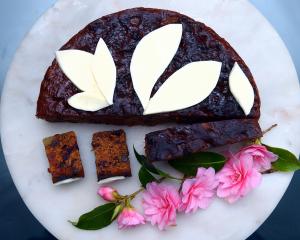
Olesia Ocheretiana has made a startling discovery since giving up her job as a chef. She likes making sweet treats.
For most of her career as a chef, she has avoided the pastry section the best she can.
The decision to give up her day job after realising the hours hospitality demanded combined with family life were getting on top of her and do something ‘‘for her’’ meant a change in direction.
‘‘I had this idea to make something sweet.’’
So about a year ago she began experimenting, searching the internet for tips on baking and what to bake. She tried macaroons, mousse cake and mirror glaze cake.
‘‘Slowly I became very interested. I’m still learning.’’

Ocheretiana is from the Ukraine. In her home country, ingredients were not so easy to source and were expensive.
Maybe her heritage is what keeps attracting her to the ‘‘old-style’’ cuisines of Europe and their more simple sweet treats.
‘‘Big cakes are a lot of work.’’
She spends hours searching the internet for traditional recipes, often searching in the language of the country to find authentic recipes and learn how to make them often with the help of Youtube videos.
‘‘You often get Americanised or Anglicised versions of recipes.’’
One of her favourite treats — pesche con ricotta cookies — came from a recipe a 90-year-old Italian grandmother in America made. Her granddaughter filmed her grandmother making them.
Treats from Italy, Spain and France — cantucci biscuits, amaretti, French madeleines, tarts — are made in her home kitchen from local free-range eggs, local honeys, fruits and nuts and local milk products.
If someone asks for a particular sweet, she will search until she has found it.

‘‘I can remember at Christmastime having this special cake, the only time we had it. I was very happy.’’
This is where her ‘‘mushroom’’ gingerbread cookies come from — they are a special treat served at Ukrainian weddings.
‘‘In my country they have royal icing and poppy seeds but mine have chocolate. It is very good to remember something special.’’
Thanks to support from the Dunedin City Council and the Farmers Market she is now a regular on the railway station platform on Saturdays.
‘‘Today I’m very happy.’’
Ocheretiana, whose career in advertising ended with the Global Financial Crisis, has mixed feelings about her homeland, a troubled country she, partner David Vincent and daughter Maria left about seven years ago.
‘‘It was a tough life there. For David it was not easy, it was a different style of life, a lot of corruption.’’
These challenges were highlighted when their daughter started school and the differences in discipline and ways of educating became apparent. .
Vincent, who is from Dunedin, and Ocheretiana met in her brother’s restaurant during a family celebration. Vincent was back in Ukraine visiting friends he had made when teaching English there years before.
‘‘I was looking for somewhere different off the beaten track.’’
As life in Ukraine was not very easy they started to look to the future for the sake of their daughter and decided to move to Poland.
‘‘When your mayor’s house is firebombed you look at what is best for your family.’’
With a similar culture and a more stable political regime, the family settled in, spending four years there. Ocheretiana was lucky to get a job in a top restaurant, becoming the head chef after a year.
Just six months after their move there was a revolution in Ukraine.
‘‘Our solution was to leave. Some stayed and fought. The brave tried to change things.’’

When their daughter reached secondary school age they thought again about moving, and New Zealand and Dunedin seemed a natural option.
‘‘In my soul I’m a village woman. Dunedin is the perfect-sized city.’’
They came to Dunedin via travels in Latin America, which enabled Ocheretiana to immerse herself in different food cultures. She developed a love for those countries’ cuisines — second only to her passion for Italian cooking.
‘‘It’s simple, very fresh. In Latin America at the markets you had choice, it was small home produce.’’
New Zealand life has come with many surprises for Ocheretiana.
In Ukraine, only rich people ate out at restaurants regularly. For most, eating out was for very special occasions or at their workplace canteen.
‘‘The majority of the population could not afford to.’’

‘‘My family always cooked. My mother, my father, he would cook something sweet, my mother beef or fish or something.’’
In Ukraine there was a big culture of preserving so excess seasonal produce was preserved to eat in the cooler months.
Ocheretiana was shocked to find in New Zealand meat was often cheaper to buy in supermarkets than vegetables.
‘‘A chicken breast in my country is very expensive.’’
Going to work in her brother’s restaurant after she lost her advertising job was not a huge stretch for her.
‘‘I liked cooking and wanted to try something different.’’
While working with her brother could be turbulent at times, she enjoyed the work although the 14 hour days with one day off was hard going.
‘‘It was very good practice, it was a good school for me.’’













